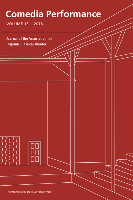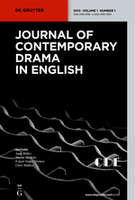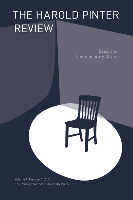
REVUE D HISTOIRE DU THEATRE
Scope & Guideline
Advancing Scholarship in Theater Studies
Introduction
Aims and Scopes
- Theatrical History and Critique:
The journal emphasizes the historical evolution of theater, examining significant movements, influential figures, and the socio-political contexts that shaped theatrical practices. - Interviews with Theatrical Practitioners:
A distinctive feature of the journal is its inclusion of interviews with actors, directors, and playwrights, providing firsthand insights into contemporary theatrical practices and personal experiences. - Landscape and Aesthetic Studies:
There is a strong focus on the interplay between theater and landscape, exploring how physical and metaphysical landscapes influence theatrical representation and audience perception. - Thematic and Genre Analysis:
The journal delves into various genres and thematic concerns within theater, including but not limited to Yiddish theater, French classical theater, and modern experimental works. - Cultural and Societal Reflections:
The journal connects theatrical studies with broader cultural and societal issues, analyzing how theater reflects and shapes public discourse and identity.
Trending and Emerging
- Environmental and Landscape Aesthetics:
There is a growing emphasis on the relationship between theater and environmental themes, particularly how landscapes are represented and experienced in theatrical settings, indicative of a broader cultural engagement with ecological issues. - Interdisciplinary Approaches:
The journal increasingly features interdisciplinary studies that integrate theater with fields such as visual arts, performance studies, and cultural studies, reflecting a trend towards holistic understanding of theater as a complex cultural phenomenon. - Contemporary Theater Practices:
A noticeable rise in discussions surrounding contemporary theater practices, including experimental forms and the impact of digital media on performance, marks an important shift in the journal's focus. - Personal Narratives and Testimonies:
The inclusion of personal narratives and testimonies from theater practitioners is on the rise, emphasizing the importance of lived experiences and subjective interpretations in understanding theater today.
Declining or Waning
- Historical Focus on Classical Theater:
There has been a noticeable reduction in papers dedicated to classical theater forms, such as those from the 17th and 18th centuries, as contemporary themes and practices gain prominence. - Traditional Literary Criticism:
The journal has seen fewer contributions that solely focus on traditional literary analysis of plays, indicating a shift towards more interdisciplinary and experiential approaches. - Narrow Thematic Exploration of Yiddish Theater:
While Yiddish theater remains significant, the frequency of focused studies on this genre has declined, suggesting a move towards broader explorations of multicultural theatrical practices.
Similar Journals

Anuario Calderoniano
Exploring the Depths of Calderonian LiteratureAnuario Calderoniano is a distinguished academic journal published by IBEROAMERICANA EDITORIAL VERVUERT S L, dedicated to the field of literature and literary theory. With an ISSN of 1888-8046 and a notable presence in the academic community, it is recognized for its insightful analyses and contributions to Calderonian studies. The journal has been systematically published from 2013 to 2015 and from 2017 to 2023, consistently examining the works of renowned playwright Pedro Calderón de la Barca and their relevance in contemporary literary discourse. As a Q3 journal in the Literature and Literary Theory category for 2023, it ranks in the 68th percentile among its peers, reflecting its importance and scholarly contribution to the field. While currently not offering open access, the journal remains a crucial resource for researchers, professionals, and students aiming to deepen their understanding of literary narratives and critical perspectives.

Samuel Beckett Today/Aujourd'hui
Fostering Critical Dialogue on Beckett's InfluenceSamuel Beckett Today/Aujourd'hui is a distinguished academic journal published by BRILL that focuses on the rich and multifaceted literature surrounding the works of Samuel Beckett. Based in the Netherlands, this peer-reviewed journal has established itself as an essential resource in the field of Literature and Literary Theory, evidenced by its impressive Q2 ranking in the 2023 category quartiles and a solid standing in the Scopus rankings, placing it within the top 59th percentile among its peers. Addressing critical interpretations, cultural contexts, and theoretical explorations of Beckett's oeuvre, it seeks to foster scholarly discourse and inspire further research and engagement. Although not an open-access publication, Samuel Beckett Today/Aujourd'hui attracts researchers, professionals, and students alike with its commitment to advancing the understanding of Beckett's literary contributions from 2001 through 2024 and beyond.

Urdimento-Revista de Estudos em Artes Cenicas
Championing Open Access to Performing Arts ResearchUrdimento-Revista de Estudos em Artes Cenicas, published by UNIV ESTADO SANTA CATARINA-UDESC, is a leading open-access journal dedicated to the field of performing arts studies. With an ISSN of 1414-5731 and an E-ISSN of 2358-6958, this journal has been freely accessible since 1997, promoting the dissemination of innovative research and critical analysis in visual and performing arts. Hailing from Florianopolis, Brazil, Urdimento invites submissions that explore a variety of interdisciplinary approaches, reflecting the journal’s commitment to enriching the academic discourse within the arts and humanities. Despite its emerging ranking at the 23rd percentile in Scopus’s classification, Urdimento serves as a vital platform for researchers, students, and professionals in the field, facilitating scholarly exchange and fostering new ideas. As the journal converges its focus from 2021 to 2024, it aims to provide inclusive and diverse perspectives on contemporary artistic practices and theories.

Early Theatre
Revealing the Voices of the Early Modern StageEarly Theatre is a pioneering journal dedicated to the study of early modern drama and theatre, published by ITER, a recognized leader in scholarly publishing. With its ISSN number 1206-9078, the journal aims to foster a deeper understanding of the rich history and cultural significance of theatrical traditions prior to the 18th century. Although it does not have an open access model, Early Theatre provides invaluable insights through rigorous peer-reviewed articles, reviews, and critical essays that underscore its commitment to academic excellence. The journal serves as an essential resource for researchers, professionals, and students interested in the intersections of literature, performance studies, and history. By publishing cutting-edge research, it plays a crucial role in enhancing scholarly dialogue and advancing the field of early theatre studies. The journal’s physical address is located at UNIV TORONTO LIBRARIES, STE 7009 130 ST GEORGE ST, TORONTO, ON M5S 1A5, CANADA, and it champions future scholarship that contributes to the ongoing conversation surrounding theatrical arts from the early modern period.

South African Theatre Journal
Navigating the Intersection of Art and Society in South AfricaSouth African Theatre Journal, published by Routledge Journals, Taylor & Francis Ltd, is an essential platform for researchers and practitioners in the fields of Visual Arts and Performing Arts. With an ISSN of 1013-7548 and an E-ISSN of 2163-7660, this journal has been contributing to the discourse on diverse theatrical practices and performance studies since its inception in 1996. The journal's focus encompasses a variety of topics, including but not limited to, South African theatre, intercultural performance, and the impact of socio-political contexts on artistic expression. Although it does not currently offer open access, its significance is reflected in its Q3 category in Visual Arts and Performing Arts and a ranking of #449/667 in the Scopus Arts and Humanities sector, positioning it as a noteworthy resource for scholars striving to explore and analyze the rich tapestry of theatrical work in South Africa. The South African Theatre Journal serves as a vital conduit for critical engagement and scholarly dialogue, making it indispensable for students, researchers, and professionals dedicated to the advancement of performing arts research.

Comedia Performance
Exploring the Intersection of Performance and CultureComedia Performance is a prestigious journal dedicated to the dynamic field of performance studies, published by Penn State University Press. With its ISSN 1553-6505 and E-ISSN 2572-4428, this journal serves as a critical platform for scholars, artists, and practitioners alike to explore the intricate relationship between performance and its cultural contexts. While it currently operates under a traditional access model, its content is invaluable for researchers interested in the rich tapestry of theatrical, musical, and experimental performance practices. The journal aims to foster interdisciplinary dialogue and promote innovative research methodologies, making it an essential resource for those looking to deepen their understanding of performance as an academic discipline. Situated in University Park, Pennsylvania, Comedia Performance continues to contribute significantly to the evolving narratives within the arts and cultural studies, encouraging scholarly conversations that resonate with both historical and contemporary performance trends.

Journal of Contemporary Drama in English
Illuminating Contemporary Voices in DramaJournal of Contemporary Drama in English is a prestigious academic publication dedicated to the exploration of contemporary drama written in English. Published by WALTER DE GRUYTER GMBH in Germany, this journal serves as a vital resource for researchers, professionals, and students engaged in the fields of literature, literary theory, visual arts, and performing arts. With an impressive impact factor reflected in its Q2 ranking in both Literature and Literary Theory and Visual Arts and Performing Arts categories for 2023, the journal demonstrates its relevance and influence in academic discourse. It provides a platform for critical examination and innovative scholarship, covering a broad range of topics related to contemporary dramatic texts and performances. The journal is committed to fostering interdisciplinary dialogue and exploring the socio-cultural contexts of drama, making it an essential reference for anyone invested in the contemporary landscape of theatre and performance studies.

Harold Pinter Review-Essays on Contemporary Drama
Illuminating Modern Drama Through Pinter's LensThe Harold Pinter Review-Essays on Contemporary Drama, published by Penn State University Press, is an esteemed academic journal dedicated to the exploration of contemporary drama through the lens of Harold Pinter's significant contributions to the field. With an ISSN of 2473-8433 and an E-ISSN of 2473-8441, the journal aims to synthesize critical essays and reviews that enhance the understanding of Pinter's work and its impact on modern theatrical practices. Engaging with a diverse range of topics related to drama, performance, and literature, this journal targets scholars, theater professionals, and students alike, providing them with a platform to share rigorous analysis and innovative perspectives. Although it does not currently operate under an Open Access model, the Harold Pinter Review remains a vital resource for anyone devoted to the study of contemporary theatre and the lasting influence of Pinter's narratives on global drama.

Journal of Austrian Studies
Advancing Interdisciplinary Insights into AustriaThe Journal of Austrian Studies, published by University of Nebraska Press, serves as a vital academic platform dedicated to the exploration of Austrian culture, literature, and theory, making significant contributions to the interdisciplinary fields of Cultural Studies and Literature. Established in 2012, this esteemed journal boasts an ISSN of 2165-669X and an E-ISSN of 2327-1809, reflecting its commitment to broad scholarly communication. Despite being positioned in Q4 for Cultural Studies and Q3 for Literature and Literary Theory as of 2023, its focus on innovative research and critical discourse allows it to remain relevant in the academic community. With Scopus rankings indicating its niche yet important place among related journals, the Journal of Austrian Studies aims to foster understanding of Austria's rich cultural heritage and its contemporary implications, appealing to researchers, professionals, and students alike who seek rigorous analysis and scholarly debate. This journal provides an inclusive forum for sharing ideas and developments, contributing to the evolving dialogue in Austrian studies.

Teatro e Storia
Celebrating the Dynamic Dialogue of Arts and History.Teatro e Storia is a prestigious journal dedicated to the intricate relationship between theater and history, fostering an interdisciplinary dialogue among scholars, practitioners, and students in the fields of performing arts and historical studies. Published by BULZONI EDITORE, this journal hails from Italy and aims to explore the social, cultural, and political implications of theatrical expressions across various epochs. With its commitment to elevating scholarly discourse, Teatro e Storia serves as a crucial resource for researchers seeking to contribute to the understanding of how theater both shapes and reflects historical narratives. Although currently not an open-access publication, it offers subscription-based access to its rich repository of articles, ensuring that thought-provoking research reaches a wider audience engaged in the vibrant tapestry of cultural history.